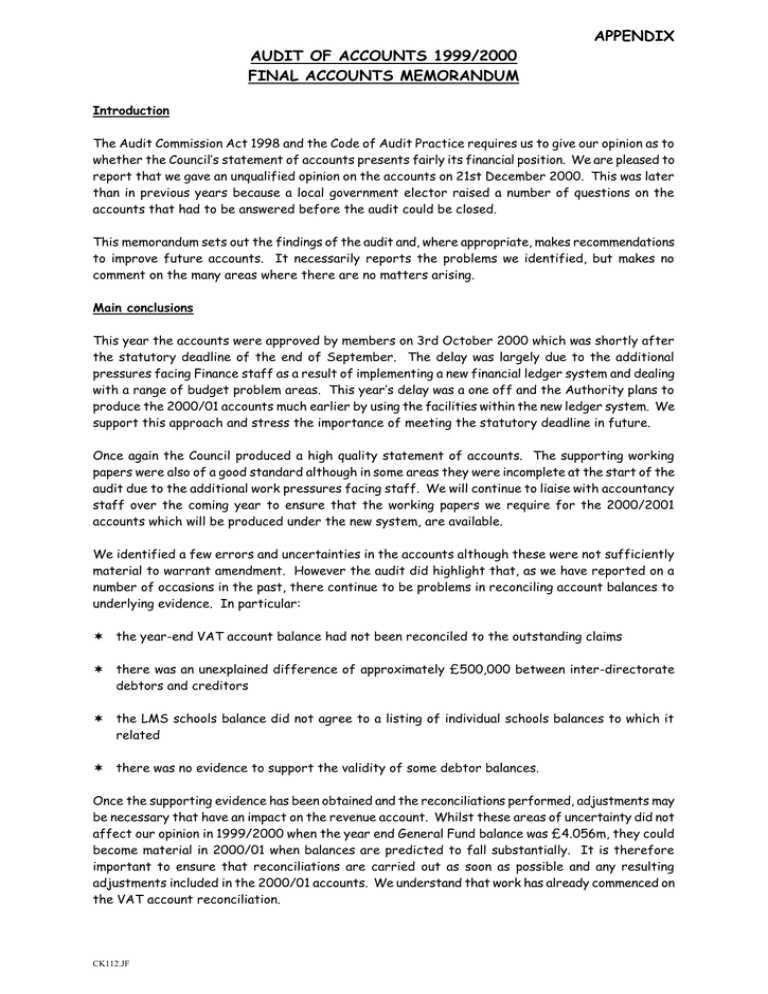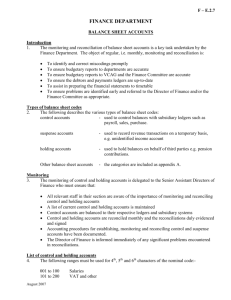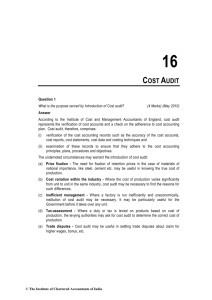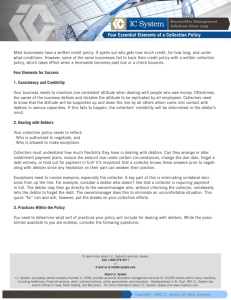APPENDIX AUDIT OF ACCOUNTS 1999/2000 FINAL ACCOUNTS MEMORANDUM
advertisement

APPENDIX AUDIT OF ACCOUNTS 1999/2000 FINAL ACCOUNTS MEMORANDUM Introduction The Audit Commission Act 1998 and the Code of Audit Practice requires us to give our opinion as to whether the Council’s statement of accounts presents fairly its financial position. We are pleased to report that we gave an unqualified opinion on the accounts on 21st December 2000. This was later than in previous years because a local government elector raised a number of questions on the accounts that had to be answered before the audit could be closed. This memorandum sets out the findings of the audit and, where appropriate, makes recommendations to improve future accounts. It necessarily reports the problems we identified, but makes no comment on the many areas where there are no matters arising. Main conclusions This year the accounts were approved by members on 3rd October 2000 which was shortly after the statutory deadline of the end of September. The delay was largely due to the additional pressures facing Finance staff as a result of implementing a new financial ledger system and dealing with a range of budget problem areas. This year’s delay was a one off and the Authority plans to produce the 2000/01 accounts much earlier by using the facilities within the new ledger system. We support this approach and stress the importance of meeting the statutory deadline in future. Once again the Council produced a high quality statement of accounts. The supporting working papers were also of a good standard although in some areas they were incomplete at the start of the audit due to the additional work pressures facing staff. We will continue to liaise with accountancy staff over the coming year to ensure that the working papers we require for the 2000/2001 accounts which will be produced under the new system, are available. We identified a few errors and uncertainties in the accounts although these were not sufficiently material to warrant amendment. However the audit did highlight that, as we have reported on a number of occasions in the past, there continue to be problems in reconciling account balances to underlying evidence. In particular: the year-end VAT account balance had not been reconciled to the outstanding claims there was an unexplained difference of approximately £500,000 between inter-directorate debtors and creditors the LMS schools balance did not agree to a listing of individual schools balances to which it related there was no evidence to support the validity of some debtor balances. Once the supporting evidence has been obtained and the reconciliations performed, adjustments may be necessary that have an impact on the revenue account. Whilst these areas of uncertainty did not affect our opinion in 1999/2000 when the year end General Fund balance was £4.056m, they could become material in 2000/01 when balances are predicted to fall substantially. It is therefore important to ensure that reconciliations are carried out as soon as possible and any resulting adjustments included in the 2000/01 accounts. We understand that work has already commenced on the VAT account reconciliation. CK112.JF We also found that although the Council’s bank account had been reconciled at year end, reconciliations had not been performed regularly throughout the year. Furthermore no bank reconciliations have been completed since the end of March although efforts are being made to bring them up to date. These lapses have largely been due to staffing problems in key positions within the Finance Division. It is important that the bank reconciliation is brought up to date as a matter of urgency as without this the Authority cannot be sure that all receipts and payments have been correctly entered in the financial ledger. The way forward Our recommendations, together with the Authority’s response, are set out in the agreed action plan overleaf and our detailed findings are in part III of the report. Control Accounts 1. In order to ensure that the entries in the ledgers are complete, they are usually structured in such a way that creditor and debtor balances are held in numerous control accounts each of which should be easily agreed/reconciled to independent evidence. We found that some control accounts on the balance sheet had not been reconciled at year end. This can lead to unexpected charges on the revenue account as errors may remain undiscovered until reconciliations are complete. In particular The year-end VAT account balance had not been reconciled to outstanding claims. In the case of VAT there is also the risk of incurring penalties as a result of erroneous claims, as has happened in the past. Work on bringing the VAT reconciliation up to date has now commenced. There was a difference of over £500,000 between the internal debtor raised by Education in respect of DSO work and the corresponding creditor raised by the schools. Last year we recommended that inter-authority debtor and creditor balances should be agreed between directorates prior to inclusion within the balance sheet. RECOMMENDATIONS R1 The VAT account should be reconciled as a matter of urgency. R2 Inter-directorate debtor and creditor balances should be agreed prior to being netted off. RESPONSE R1 Reconciliation of the VAT Control Account is nearing completion. Unfortunately the reconciliation has been suspended to allow more pressing work to be carried out. It is hoped that a final position on the account will be reached by the end of April at which time it will be discussed with the VAT Officer. A major problem with the exercise is that there have been no effective reconciliations carried out on the account for a good number of years. R2 Over the last few years there has been a significant improvement in eliminating internal debtors and creditors and in the main the current imbalance relates to the Education directorate and its financial relationships with schools. This issue will be addressed during the closure of the 2000/2001 final accounts. CK112.JF Cash and Bank 2. The bank reconciliation forms a vital control which underpins the whole accounting process, proving that the cash entries in the ledgers are complete. During our audit we found that: The bank reconciliation was not completed regularly during 1999/2000 although it was brought up to date for the year end. The £200k bank balance held by St. Ambrose school was not included in the closing bank balance. This affected both the bank balance and the schools reserves. There had been no bank reconciliation completed during 2000/01 largely due to staffing problems within the Finance Division and the additional demand placed upon staff by the new financial ledger. Work to bring the bank reconciliation up to date has now commenced. RECOMMENDATION R3 The bank reconciliation should be brought up to date as a matter of urgency. The reconciliation should be completed on a timely basis in future. RESPONSE R3 It is agreed that at the commencement of the final accounts audit the bank reconciliation in respect of 2000/2001 had not begun. Work has been completed on each of the various elements which make up the overall reconciliation exercise and an action plan has been drawn up which seeks to bring the work up to date by the end of March. At present steady progress is being made to achieve the timetable. Debtors 3. Debtors become more difficult to collect as they become older. Where debtor balances remain unreconciled to supporting evidence for long periods this also makes collection more difficult and increases the likelihood of there being a charge on the revenue account if the balance has to be written off. During our audit of debtors we found that: The age of some of the sundry debtors outstanding, together with the Authority’s historical debt collection rates, raises doubts about their recoverability. In our view the bad debt provision on sundry debtors is understated by approximately £400,000. The balance sheet contained various debtors that were not adequately supported. These included:Non Statutory Housing Associations of £107,000 some of which date back to 1975 and were still uncollected at the time of the audit. Property rent of £51,000 in respect of the first quarter of 2000/2001. The property to which it relates was disposed of and a credit note, for the rent, was raised in 2000/2001. Income of £27k for which a credit note was raised in 2000/2001. Various grant debtors that were incorrectly stated, resulting in debtors CK112.JF being understated by £27,000. A balance of £8,000 on the mortgage suspense account. This account should have a nil balance. A miscellaneous credit balance of £5,614 should be reviewed and cleared. The accounts, in common with those of many other authorities, do not include a debtor relating to housing benefits overpaid to claimants, which the authority can recover. There are currently £4.960m of such overpayments. It would be sensible when recognising this debt to make an equivalent bad debt provision. RECOMMENDATIONS R4 Officers should review the adequacy of the bad debt provision for sundry debtors. R5 The £107,917 debtor ‘Non Statutory Housing Associations’ should be proved and collected or written off. R6 Care should be taken to ensure that large credit notes issued after the year end, which affect the year of account are treated correctly. R7 The balance of £8,000 on the mortgage debtor suspense account should be proved or written off. R8 All debtors in the accounts should be backed up by adequate supporting evidence. R9 The housing benefit overpayment debtor should be recognised and provided for in full. RESPONSE R4 The bad debts provision for sundry debtors is reviewed each year during the closure of final accounts. The level of the provision at 31st March 2000 complies with the appropriate recommendations in the Code of Practice. The amount will be reviewed again during the 2000/2001 closure of accounts. R5 The two housing associations concerned have been contacted and it has been agreed to discuss the matter further with each of their head office to consider possible write off. If the write offs are not agreed by the housing associations then the item is to be capitalised in the current financial year. R6 The item of £27,000 related to a debtor which was raised in 1996 to come into effect when a residents property was sold. On the sale of the property the amount of the debt was reassessed and reduced but unfortunately the amount involved was credited to revenue in error. the balance of the debt should have been written off in 1997/98 by raising a credit note but this was not carried out until 1999/2000. Closer checks are now being kept on invoices raised against properties and regular reassessments are taking place. RESPONSE (continued) CK112.JF R7 The amount relates to income received in 1999/2000 which had not been identified. £5,800 has since been identified and the balance will be credited to revenue in 2000/01. R8 The balance is represented by a long standing debtor which has now been written off and the payment of an insurance claim which has been transferred to capital receipts. R9 It is accepted that the overpayments should be recognised as a debtor balance together with a corresponding credit being set up in a provision for non recovery. There will be no impact on the published accounts as the provision will be set off against the debtor but appropriate details will be included in the notes to the accounts. Collection Fund 4. The Collection Fund is a separate account governed by statute. In January each year the Council should estimate the balance on the Fund and adjust the following year’s council tax for any under or over recovery. The estimate of the balance should take account of the level of arrears and the size of the provision for bad debts. During the audit of the Collection Fund we found that: The collection rate of council tax required to balance the Collection Fund far exceeds the current collection rate. As a result, the bad debt provision for council tax is understated by £2.7m. Officers have recognised this and have put in place a mechanism, by declaring a Collection Fund deficit of £550,000 a year for this and the next 4 years, to address the situation. Unless collection rates improve these measures will not be sufficient to balance the Collection Fund because additional bad debts are likely to accrue over the five year period. 5. We recognise that it would place significant burden on the council tax payers if the under provision on bad debts was made good in one year. Nevertheless failure to do so is contrary to the Code of Practice on Local Authority Accounting. Every effort should therefore be made to recover the deficit as soon as possible and in the meantime this departure from the Code should be disclosed by way of a note to the accounts. RECOMMENDATIONS R10 Officers should closely monitor the collection rates of council tax in 2000/01 and assess whether an additional contribution for bad debts is required. R11 Unless bad debts are fully provided in 2000/01, the departure from the Accounting Code of Practice should be disclosed. RESPONSE R10 Council Tax collection rates are treated as a key performance indicator and revenue officers constantly monitor collection rates and liaise with accountancy staff. The work associated with the Collection Fund estimate and Final Accounts involves a detailed analysis of collection rates. This process served to identify the population drift away from the City Council and assess the impact on collection targets and resulted in the declaration of deficits as mentioned in the report. CK112.JF R11 A calculation of the required bad debts provision based on the guidance issued by CIPFA is included within the collection fund file. The resulting total suggests that the bad debts provision provided in the accounts is far in excess of that required. However, it is accepted that this does not take into account movements in population and therefore a more prudent approach is taken by the City Council. The calculation of the Council Tax base has now been adjusted to reflect the likely reduction in households and it is anticipated that this together with the action already implemented will enable the City Council to meet its overall budget requirement. Therefore, the accounting treatment adopted by the City Council is not considered to be a departure from the Accounting Code of Practice. Fixed Assets 6. The fixed assets are valued at £875m, £553m of which is council dwellings. The council dwellings should be valued by type and age. Due to an adjustment for disposals in 1999/2000 which used an average value, the link between individual asset valuations and the total value has been lost. However as this is the first year in which this approach has been used it should be relatively easy to correct. RECOMMENDATION R12 The link between the asset age and type and valuations should be re-established. RESPONSE R12 The valuation of the Housing stock is based on the asset age and type of property and this was the basis used in the 1999/2000 accounts. However, an error on the summary schedule of values of Council Houses meant that 328 "disposed of properties" were included in the total value. These were subsequently written out based on the average value of the total stock rather than their individual value. This approach was adopted to keep within the deadline for the completion of the accounts and did not materially effect the accounts. The schedule used for 2000/01 will be reconciled back to the relevant transactions and the direct link mentioned above will be re-established. Stock and Work in Progress 7. Stock and Work in Progress (WIP) do not usually form a significant balance on a local authority’s balance sheet, but where that stock originates from a DSO it can be material to that DSO. WIP represents partly completed jobs that have not been invoiced to customers. During our audit we found that: There were DSO WIP balances, in Highways and Legal Services amounting to £28,000, which related to work undertaken for other Council directorates. The inclusion of internal WIP in the accounts is contrary to CIPFA guidance which requires internal WIP to be eliminated by way of a consolidation adjustment. RECOMMENDATION CK112.JF R13 Internal DLO and DSO work in progress should be eliminated from the accounts by way of a consolidation entry. Such work represents costs incurred which should be charged as local authority expenditure for the year. RESPONSE R13 Agreed: Any internal DSO/DLO internal work in progress will in future be eliminated from the accounts. Funds and Reserves 8. The balance sheet contains various sums of money that although available at the balance sheet date have been carried forward for different reasons in to future years. During the audit of funds and reserves we found that: The Local Management of Schools (LMS) reserves included in the balance sheet were £128,000. However, Education have provided a list of LMS reserves by school which totals £257,000 more than this. RECOMMENDATION R14 Officers should ensure that the reserves schools may be using to support their spending plans agree to the reserves included in the Council’s accounts. RESPONSE R14 Agreed: Steps have been introduced to agree school balances with the amount included in the balance sheet. Consolidated Revenue Account 9. The Authority is required to disclose any transactions with related parties in a note to the Consolidated Revenue Account. A detailed system has been established to identify any transactions in respect of members and officers whereby they are required to complete a questionnaire outlining potential transactions each year. In 1999/2000 the response to the questionnaire was incomplete with only 57% of members and 73% of officers replying. 10. We also found that the building control activity made a deficit of £96,000 in 1999/2000. As this service is required to break-even over a three year rolling period the Authority needs to ensure that it is meeting this statutory target. RECOMMENDATIONS R15 Ensure that all members and senior officers complete the questionnaire on related party transactions. R16 Review the trading position of the building control function to ensure that it breaks even over a three year rolling period. RESPONSE CK112.JF R15 Both Members and Chief Officers were requested in June 2000 to complete related party transactions returns prior to the closure of the final accounts. The number of completed forms received was higher than in the previous year (the year of inception) but unfortunately all the forms were not returned. Members of this committee are asked to instruct all Members and Chief Officers who receive an appropriate form to return them in accordance with the deadline set. R16 Agreed: The trading position of the building control function has been reviewed and a higher level of income is now forecast for future years. This should ensure that there is an overall break even position over a three year rolling period. Housing Revenue Account 11. The Housing Revenue Account (HRA) is a separate statement in the accounts. During the audit of the HRA we found that: There were some small presentational discrepancies in the HRA disclosures which have been discussed with the Housing Accountant and will be considered in 2000/2001. Trust Funds 12. The Council administers a number of Funds on behalf of Trusts, but officers are unsure of the makeup of trustees for each Fund. We first highlighted this issue in our 1998/99 final accounts memorandum. Until the Council establishes this information, it cannot be sure that Trust Funds are complying with the Accounting Code of Practice and the Charities Act in their disclosures and audit regimes. RECOMMENDATION R17 The Council should establish who the trustees of each fund are and subsequently ensure that they comply with the Accounting Code of Practice and the Charities Act. RESPONSE The Head of Law and Administration is endeavouring to prepare a detailed report on the City Council’s interests in both Trust Funds and Companies as soon as possible and this should be available next month. Investments and interests in companies 13. The Council has interests in various companies but is unsure of the exact nature of the holding in some of these. Work on classifying the interests in companies has been on-going since 1997/98 but until this information is known the Council cannot be certain that the correct disclosures are being made in the accounts. RECOMMENDATION R18 The Law and Administration Division should finalise its classification of the Council’s CK112.JF related businesses and companies and then keep this up to date for inclusion in the statement of accounts. RESPONSE The Head of Law and Administration is endeavouring to prepare a detailed report on the City Council’s interests in both Trust Funds and Companies as soon as possible and this should be available next month. CK112.JF





